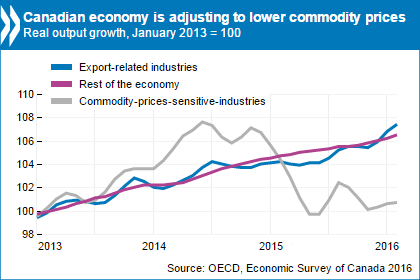Canada is adjusting to the end of the commodities boom, but new policies are needed to boost productivity and reduce financial stability risks
13/6/2016 – The Canadian economy is adjusting to the fall in commodity prices, but additional policies are needed to boost productivity, reduce financial stability risks and make future growth stronger, greener and more inclusive, according to a new OECD report.
The latest Economic Survey of Canada, presented today in Montreal by OECD Secretary-General Angel Gurría and Canadian Finance Minister Bill Morneau, underlines the slowdown in growth attributed to falling output in natural resource-based sectors, particularly energy. The Survey projects GDP growth of 1.7% this year and 2.2% in 2017, as the economy shifts toward non-resource-based activity.
“The Canadian economy is proving resilient, but continues to face headwinds from the low growth trap facing the global economy,” Mr Gurría said. “Canada’s economic policy settings are appropriate, given the risky international environment, but there is still scope for reforms to boost competition, stimulate business dynamism and ensure better economic outcomes for all Canadians.”

The Survey points out that vulnerabilities relating to house prices and household debt are acute and says that a continued tightening of macro-prudential measures will be necessary to prevent the risks from building further. Targeting such measures on the hotspots of Vancouver and Toronto, including through increased capital requirements, may be beneficial.
To boost productivity growth and lay the foundation for future economic expansion, the Survey suggests that Canada eliminate the high barriers to competition in network sectors and reduce foreign ownership restrictions in air transportation, telecommunications and broadcasting, where cultural objectives could be achieved by other means.
Barriers to competition in fragmented electricity markets could be reduced through development of new east-west interconnections, when there is an economic case to do so. Liberalisation of the generation and distribution sectors would encourage wholesale and retail competition in jurisdictions that have not done so yet.
Harmonising provincial and territorial regulations for trade in goods and services would remove key barriers to internal trade and could be promoted through establishment of a pan-Canadian regulatory cooperation council.
A more dynamic small business sector, with higher start-up rates and strengthened ‘up-or-out’ dynamics, would increase productivity by speeding up the diffusion of new technologies. Governments can create a better environment for small business dynamism by reviewing small business programmes, including preferential tax arrangements, the Survey said.
Increasing federal investment in physical infrastructure, social housing, education and innovation, as planned, would help make growth stronger and more inclusive, as will the new government’s enhanced efforts to share more of the fruits of economic growth with Canada’s Indigenous Peoples.
Canadian governments should also act on their recent Vancouver Declaration to ensure that an adequate price is placed on carbon emissions across the country to allow Canada to meet its international climate change commitments.




